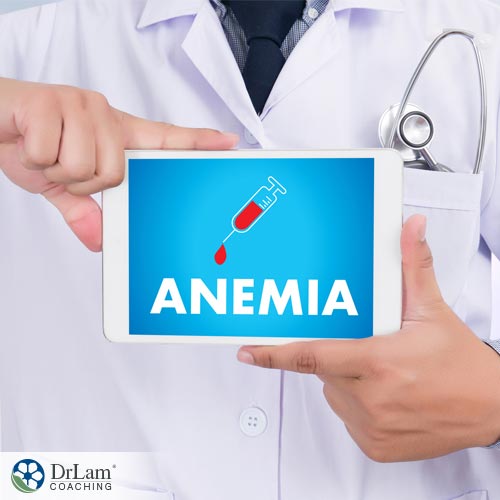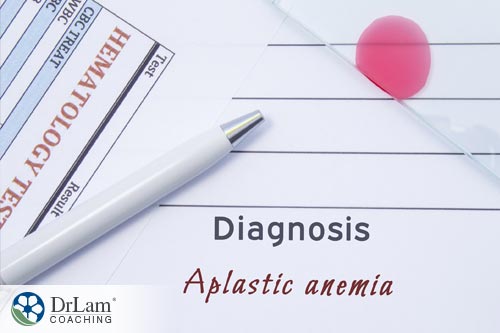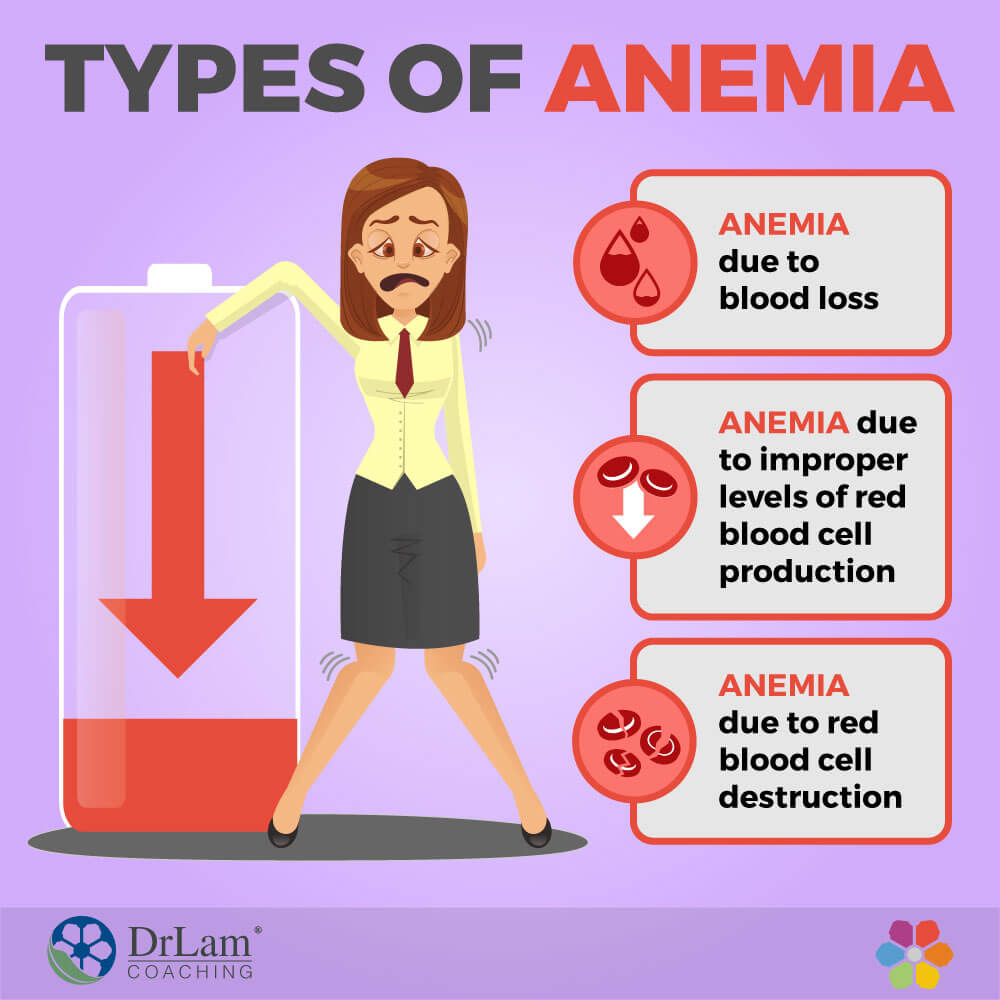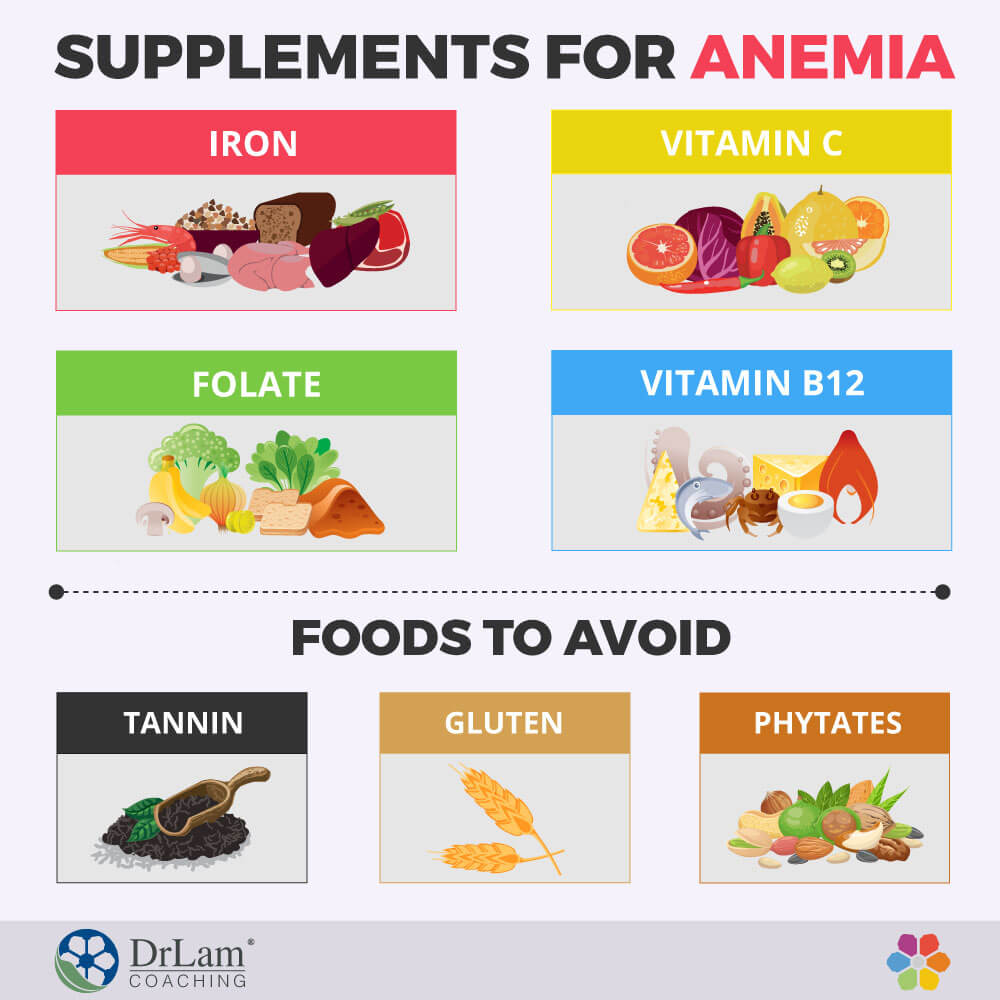Do any, or a number, of these symptoms seem familiar to you: brain fog, brittle nails, dry hair, headache, restless legs, food cravings, problems with your menses, feelings of anxiety, heart palpitations, or constant fatigue? Are you pale in complexion and is the waterline around your eyes light in color? If your answer is yes to a number of these issues, you might need to have yourself checked out for anemia.
 Anemia is a surprisingly common yet often overlooked condition that develops due to a lack of red blood cells or hemoglobin, which results in too little oxygen throughout the body. Red blood cells bind with oxygen and transport it to all organs and systems. When the cells in your body do not get the adequate amount of oxygen they need, your body warns you by displaying certain symptoms such as fatigue, for example.
Anemia is a surprisingly common yet often overlooked condition that develops due to a lack of red blood cells or hemoglobin, which results in too little oxygen throughout the body. Red blood cells bind with oxygen and transport it to all organs and systems. When the cells in your body do not get the adequate amount of oxygen they need, your body warns you by displaying certain symptoms such as fatigue, for example.
In the United States alone, anemia affects over three and a half million people, with women and young children being most at risk. This is because women, in particular, may develop an iron deficiency due to menstruation, as well as an increase in the body’s demand for blood supply while pregnant. Older people may develop anemia because their diet has certain deficiencies or as a result of comorbid medical issues. Children may have anemia from birth, as certain forms of this condition are hereditary. In other words, it may be genetic.
The different types of anemia have different root causes, implying that treatment for each may be different.
There are over 400 different types of anemia, but they can all roughly be divided into three groups:
Each individual has three different types of blood cells. White blood cells are necessary for fighting off infections. Platelets help with blood clotting. Red blood cells carry oxygen from the lungs which is then distributed throughout the body, while carbon dioxide, also carried by the blood, is returned to the lungs and exhaled. Adequate, healthy red blood cells are thus an important factor in anemia prevention.
Blood cells are produced in the bone marrow. In order to produce ‘healthy’ blood, your body needs an adequate supply of iron, vitamins and minerals from your diet.
Anemia due to blood loss is very common in women of childbearing age. One of the most common contributors to this condition is heavy blood loss through menstruation. The condition is also common due to childbirth or in cases of multiple pregnancies.
Other conditions leading to blood loss include gastrointestinal disorders or conditions including cancer, hemorrhoids, ulcers or gastritis. Certain anti-inflammatory drugs may also pose a higher risk to blood loss, e.g. ibuprofen or aspirin, both of which may cause gastritis and the formation of ulcers that bleed.
Certain conditions may have a negative impact on the production of red blood cells. Sickle cell anemia, for example, is an inherited condition, and in the USA, affects mainly people of Hispanic or African-American descent. A genetic defect causes the red blood cells to become crescent-shaped, break down quickly and thus not supply enough oxygen throughout the body. These misshapen red blood cells may also get stuck in blood vessels and cause pain and blood clots.
 Aplastic anemia, which may also be inherited, is often the result of bone marrow injuries due to infection, radiation, medication, or chemotherapy. Another inherited cause of anemia is thalassemia, a condition affecting mainly those from African, Southeast Asian, Mediterranean, and Middle Eastern countries. Another reason for anemia due to lowered production is lead poisoning from exposure to lead. In some cases, lowered red blood cell production may also be due to a hormonal issue or dietary deficiencies, such as a low intake of iron, Vitamin B12, or folate. Your bone marrow needs a constant, adequate supply of iron in order to produce more blood, more particularly the hemoglobin in red blood cells. Anemia due to a lack of iron may be caused by a poor diet that does not contain enough iron, iron stores becoming depleted due to pregnancy, loss of blood due to menstruation or blood donation, issues with the digestive system and inability to absorb iron, over-exercising, or certain medications, food, or stimulant use such as caffeine.
Aplastic anemia, which may also be inherited, is often the result of bone marrow injuries due to infection, radiation, medication, or chemotherapy. Another inherited cause of anemia is thalassemia, a condition affecting mainly those from African, Southeast Asian, Mediterranean, and Middle Eastern countries. Another reason for anemia due to lowered production is lead poisoning from exposure to lead. In some cases, lowered red blood cell production may also be due to a hormonal issue or dietary deficiencies, such as a low intake of iron, Vitamin B12, or folate. Your bone marrow needs a constant, adequate supply of iron in order to produce more blood, more particularly the hemoglobin in red blood cells. Anemia due to a lack of iron may be caused by a poor diet that does not contain enough iron, iron stores becoming depleted due to pregnancy, loss of blood due to menstruation or blood donation, issues with the digestive system and inability to absorb iron, over-exercising, or certain medications, food, or stimulant use such as caffeine.
Fragile red blood cells may often not be able to handle the rigors associated with being part of the body’s circulatory system. This results in them rupturing. This means there are fewer left that can fulfill the function they were designed for, resulting in what is referred to as hemolytic anemia.
Causes of this specific type of anemia include infections, toxicity (e.g. due to kidney or liver conditions), immune system disorders, inherited conditions, tumors, burns, hypertension, and in certain rare cases, an enlarged spleen.

There is a vast array of symptoms associated with the different types of anemia. Some symptoms, however, are common, and interestingly are also found in those who suffer from adrenal fatigue. The symptoms often associated with anemia include:
It would be presumptuous and incorrect to say that adrenal fatigue plays a role in the prevalence of anemia. The causes of this condition are just too wide and varied to even attempt to make such a claim. However, the opposite may very well be true, and anemia may indeed be one of the contributory factors for the development of adrenal fatigue. Indeed, in certain circumstances, it may even be one of the symptoms of the condition.
Adrenal fatigue is a condition resulting from compromised adrenal glands and a result of what is known as the NeuroEndoMetabolic (NEM) Stress Response and complications that arise therefrom. Under normal stressful circumstances, your adrenal glands produce more cortisol in order to help you cope. You become more alert, and your body is readied in order to either ‘fight or flee’. Once the situation passes, your body’s cortisol production returns to normal.
With prolonged, higher cortisol production, as is the case with prolonged stress, different body functions cease or slow down, including the production of certain hormones. The result is the presentation of a large, varied set of symptoms that at first glance seem to have nothing to do with each other. The opposite is in fact true. Additionally, someone with adrenal fatigue does not necessarily present all the symptoms of the condition. This implies that treatment of the condition may vary from one person to another, with treatment being specific to each person.
Self-treatment of the condition, as is the case with anemia, should not be done without the supervision of a healthcare professional cognizant of the condition, as much harm can result if these conditions are incorrectly addressed. In most instances, finding the root cause is an important contributing factor for success in recovering from the condition.
There are myriad contributing stress factors resulting in an increased (and prolonged) production of cortisol and the possibility of adrenal fatigue as a result. These include:
Anemia may affect your health on many levels. These include:

The consequences of one or a few of these dangers, may have a long-term debilitating effect on your general health, often leading to a variety of new symptoms that may be difficult to trace back to the root cause, in this case anemia. Many of these conditions are also present in the case of adrenal fatigue.
Just as in the case of adrenal fatigue, addressing anemia is a long process, and support depends on the cause of the condition. There are, however, a few things you can do to help with this condition. Most have to do with your diet.
Incorporating foods that are rich in iron into your diet contributes towards resolving an iron deficiency. Foods to consider include red meat, dark green leafy vegetables, beans, and lentils.
Vitamin C helps with iron absorption. Foods to consider include citrus fruits, melons, strawberries, peppers, broccoli, and tomatoes.
Vitamin B12 is necessary for red blood cell production. Oxygen is transported by means of red blood cells. Foods containing vitamin B12 include fish, milk, cheese, eggs, and red meat. Liver is also a good source but not recommended for pregnant women.
Folate (folic acid) is necessary for the blood-making process in our bodies. Your body cannot store large quantities of folate, so you constantly need to get a new supply via your diet. Foods rich in this vitamin include kidneys, cabbage, brussel sprouts, black-eyed peas, asparagus, spinach, kale, parsnips, beans, and liver. Please take note that liver is not recommended for pregnant women.
Taking multivitamins may aid you in getting the correct dose of vitamins and minerals that your body needs on a daily basis. It is best, however, to consult with a healthcare practitioner before taking any supplements in order to get the one that is right for you.
If inherited anemia is prevalent in your family, do consider talking to a healthcare practitioner about the chances of passing it on to your children as well as discussing ways, besides diet, to support your particular condition.
In some cases, anemia cannot be prevented, e.g. when it is the genes. But by following a healthy diet and taking care of your health, you may go a long way in preventing the ill effects of the condition. If living or visiting areas where malaria occurs, do take the preventative measures necessary not to be infected, as malaria is a common cause of anemia.

There are a number of foods that people prone to anemia may consider leaving out of their diet. These include:
 Tannin interferes with the iron absorption from plant matter. Sources of tannin include black tea, green tea, sorghum, grapes (including wine), and corn.
Tannin interferes with the iron absorption from plant matter. Sources of tannin include black tea, green tea, sorghum, grapes (including wine), and corn.
Gluten damages the intestines, preventing the absorption of iron and nutrients in those with celiac disease or who have an autoimmune disorder. You could develop anemia if these conditions are not addressed. Foods rich in gluten include barley, rye, oats, and wheat.
Phytates (phytic acid) prevent iron absorption by bonding with iron in your digestive system. Sources include foods that are high in fiber.
Anemia is a very common condition, especially in women of childbearing age. There are many different types of anemia and the cause of each is multifactorial. Some of these factors include genetics, diet, blood loss, and other health conditions.
Anemia is a huge stressor on the body, because when you have it, your body is not getting the oxygen it needs to operate optimally. That’s why one of its most obvious symptoms is fatigue. Not only is the lack of oxygen making you tired, but it also can trigger adrenal fatigue and NEM dysregulation.
In cases where anemia is caused by blood loss or dietary issues, you can resolve it by changing your diet and perhaps introducing some supplements to give you a headstart. But you do need to be careful with supplementation if you have AFS, especially if it’s more advanced. Paradoxical reactions and even adrenal crashes can happen if you overload your system with too many (or the wrong type) of supplements. That’s why you need the guidance of a healthcare professional who is well-versed with AFS and the NEM Stress Response.
And even in the cases where anemia is caused by hereditary factors or other health conditions, you can still go a long way in managing it by implementing good dietary and lifestyle practices. So don’t give up hope if that’s your situation.
If you have questions about anemia, how it affects adrenal fatigue, and supplementation best practices, you can contact the Dr. Lam Coaching team. We can offer you a free** no-obligation phone consultation at +1-626-571-1234 where we will privately discuss your symptoms and what your options are. You can also send us a question through our Ask The Doctor system by clicking here.
When it comes to acquired anemia, this may very well be true. Both menstruation and pregnancy may lead to anemia. This is due to blood loss when menstruating, and the strain a pregnancy may put on your body’s system regarding oxygen supply.
